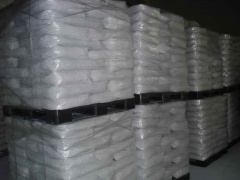Difference between revisions of "Lithopone"
| Line 2: | Line 2: | ||
| image = Lithopone.jpg | | image = Lithopone.jpg | ||
| origin = - | | origin = - | ||
| − | | stowage factor = | + | | stowage factor = 1,26 m<sup>3</sup>/t (bags) |
| humidity and moisture = - | | humidity and moisture = - | ||
| ventilation = - | | ventilation = - | ||
| − | | risk factors = | + | | risk factors = See text |
}} | }} | ||
| − | + | ==Description / Application== | |
| − | Lithopone is produced by precipitation through filtering, heating and quenching works and used as a base for pigment in paint, inc, cosmetics and many other applications in the plastic industry. It is also used as a filler in paper, [[leather]] and [[linoleum]]. Its use has meanwhile mostly been replaced by Titanium Dioxide which is more durable. | + | Lithopone is a white pigment (granular, white or greyish powder) consisting of a mixture of barium sulfate and zinc sulfide. It is used in interior [[paints]] and in some enamels. It is widely used for white paint, albeit now largely replaced by titanium dioxide.<br><br> |
| − | <br><br> | + | Lithopone is produced by precipitation through filtering, heating and quenching works and used as a base for pigment in paint, inc, cosmetics and many other applications in the plastic industry. It is also used as a filler in paper, [[leather]] and [[linoleum]]. Its use has meanwhile mostly been replaced by Titanium Dioxide which is more durable.<br><br> |
| − | Absorbs carbon dioxide from the air. Insoluble in common organic solvents and water. Turns yellow on heating. <br><br> | + | It is a valuable pigment that is brilliant white with fine texture which is advantageous vs white [[lead]]. It mixes well with oils such as [[linseed oil]] or varnish, turns grey very fast in sunlight and white again in the dark.<br><br> |
| − | Reference is made to the relevant IMO regulations of hazardous cargo. | + | ==Shipment / Storage / Risk factors== |
| − | <br><br> | + | Absorbs carbon dioxide from the air. Insoluble in common organic solvents and water. Turns yellow on heating.<br><br> |
| − | + | Reference is made to the relevant IMO regulations of hazardous cargo and applicable MSDS sheet.<br><br> | |
| + | |||
| + | |||
| − | |||
[[Category:Products]] | [[Category:Products]] | ||
| + | [[Category: Oil and chemicals]] | ||
Latest revision as of 09:40, 6 August 2013
| Infobox on Lithopone | |
|---|---|
| Example of Lithopone |  |
| Facts | |
| Origin | - |
| Stowage factor (in m3/t) | 1,26 m3/t (bags) |
| Humidity / moisture | - |
| Ventilation | - |
| Risk factors | See text |
Lithopone
Description / Application
Lithopone is a white pigment (granular, white or greyish powder) consisting of a mixture of barium sulfate and zinc sulfide. It is used in interior paints and in some enamels. It is widely used for white paint, albeit now largely replaced by titanium dioxide.
Lithopone is produced by precipitation through filtering, heating and quenching works and used as a base for pigment in paint, inc, cosmetics and many other applications in the plastic industry. It is also used as a filler in paper, leather and linoleum. Its use has meanwhile mostly been replaced by Titanium Dioxide which is more durable.
It is a valuable pigment that is brilliant white with fine texture which is advantageous vs white lead. It mixes well with oils such as linseed oil or varnish, turns grey very fast in sunlight and white again in the dark.
Shipment / Storage / Risk factors
Absorbs carbon dioxide from the air. Insoluble in common organic solvents and water. Turns yellow on heating.
Reference is made to the relevant IMO regulations of hazardous cargo and applicable MSDS sheet.











